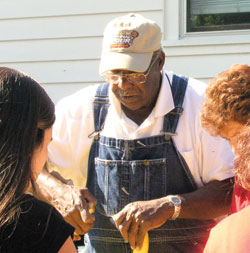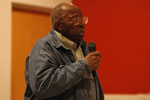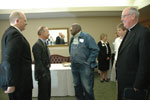Lucious Newsom, ‘the Lord’s beggar for the poor,’ dies at 93

For Lucious Newsom, helping the poor involved respecting their dignity. When companies donated food to help the poor, Newsom set it up so people could choose what they wanted to take. Newsom died on Aug. 18 after a battle with cancer. (File photo by John Shaughnessy)
By John Shaughnessy
Let’s start with a telling story from the remarkable life of Lucious Newsom, “the Lord’s beggar for the poor” who died on Aug. 18 after 20 years of feeding the needy in Indianapolis and nourishing the souls of the volunteers who helped him.
The story involves one of the thousands of people the retired Baptist-minister-turned Catholic served as he drove through the city in his white van while wearing his trademark blue bib overalls and a gold crucifix that was a gift from the families he helped.
In the story, Newsom befriended a little girl whose heart was broken when her mother walked out the door of their family’s home and never returned, leaving the girl, her sister and their father behind.
“The little girl stopped talking after that, for about three years,” recalls Bill Bahler, one of the countless Catholics who volunteered to help Newsom aid people in areas often scarred by poverty, crime and drugs.
“Lucious would stop by, talk to her, give her family food and encourage her. One Easter, he took her and her sister to get Easter clothes. As they’re leaving the store, the little girl sees a watch and points to it. Lucious asks the sales lady how much it is. She tells him $25. Lucious tells her, ‘I spent all my money here, but I want that watch for her.’ He told her he would bring the money back, but the lady said she couldn’t give it to him.
“He asks to talk to the manager. The manager gave him the watch and, of course, Lucious later came back and paid for it. After he took the girls home to their father, Lucious was driving away when the father rushed out and stopped him. He wanted him to come inside. ‘You’ve got to hear this,’ the father said. When they were inside, the father said to the girl, ‘What did you just say?’ She said, ‘He’s a good man.’
“Those were the first words she said in years. Lucious started crying. That was the touch he had. He was unbelievable.” (continue reading this story below the following links)
More features with this story:
News stories from our archives that feature Newsom | Photos | Quotes
Matters of food and faith
An Easter story seems an appropriate place to begin any memories and eulogies of the 93-year-old Newsom—a man who rose above traditional ways of caring for the poor by offering them dignity and everything he had, including tireless energy and complete faith in God’s goodness.
Newsom arrived in Indianapolis from Tennessee more than 20 years ago to help serve a Thanksgiving meal of turkey, potatoes and vegetables for the poor.
Newsom loved helping, and he loved seeing the grateful looks on people’s faces, so he excitedly asked the other ministers, “What are we going to do tomorrow?” When they told him the event was just once a year, Newsom didn’t understand. He wanted to do more. He had to do more.
So he established several locations around the city where he and his volunteers set up tables and stocked them with the fruits, vegetables, salads, breads and meats he had begged for and collected. He wanted it to look like a grocery store. He wanted to give the people a choice and a sense of dignity.
“The misnomer here is that he came to Indianapolis to feed the poor,” says Pat Fitzgerald, a longtime friend and volunteer who is a member of the Nativity of Our Lord Jesus Christ Parish in Indianapolis. “That’s not true. The reason he came to Indianapolis was to teach us how to treat the poor.”
To make his point, Fitzgerald shares a story that revolves around an overly ripe cantaloupe that had a few mushy, soft spots. As he held the donated cantaloupe, Fitzgerald remembered his childhood and his saintly mother and how she would have told him that at least one part of that cantaloupe was probably salvageable to eat. So Fitzgerald put the cantaloupe on the table for the poor, which Newsom noticed.
He quietly asked Fitzgerald if he would offer rotten fruit to Jesus. When Fitzgerald said no, Newsom softly told him to remove the cantaloupe from the table.
“He said sometime during the day Jesus would be walking through that line and we have to offer Jesus the best we have,” Fitzgerald recalls. “Lucious said if Jesus came back to earth, these would be the neighborhoods and the people he would come to. After working with him, I understood exactly what he meant. Jesus would visit the rich and the tax collectors, but he loved the poor.”
Fitzgerald pauses and then says, “His life was like Scriptures opened up. He’s like an apostle. I watched him pray all the time. He’d say, ‘I love you, Jesus.’ Every step he took was in faith. He lived his faith every day.”
His Catholic faith was a gift of grace that came to Newsom late in his life. He gave special credit to Father Steven Schwab—now the pastor of St. Thomas Aquinas Parish in Indianapolis—for leading him to the faith.
“I really had the privilege of bringing Lucious into the Church in 1995 at Easter,” Father Schwab recalls. “Most of the people who first helped Lucious were Catholic. He worked with so many Catholics that he just fell in love with the Church. He was really attracted to the intercession of the saints. He really did have a devotion to St. Jude. I think it’s because he was dealing with impossible causes every day.”
Father Schwab compares Newsom’s “hands-on” ministry to the poor as following in the tradition of St. Vincent de Paul, Dorothy Day, St. Katharine Drexel and Blessed Teresa of Calcutta.
“I think he was very serious when he introduced himself as a beggar for the poor,” Father Schwab says. “He was really able to see the face of God in the poor, more than anyone I’ve ever known. The first thing that struck me about Lucious was he didn’t have to do this. He was retired. And he worked at least 80 hours a week, operating out of love and compassion. Lucious didn’t have any sense of limits.”
A lasting lesson in life
That quality was especially evident during his efforts to establish “Anna’s House,” a clinic and learning center near downtown Indianapolis that offers food, dental care, medical help and educational services for people in need. The house was named in honor of Anna Molloy, a girl who was born with a rare genetic disorder and helped Newsom serve the poor from her wheelchair.
As Anna’s House took shape in 2005 and 2006, Pete Molloy, Anna’s father, learned the power of faith from Newsom.
“I remember sitting down with Lucious and telling him we had to have a major fundraiser to raise $100,000 to help build the house,” says Molloy, a member of St. Jude Parish in Indianapolis. “He told me I didn’t have enough faith. He said what we needed, God will provide. He convinced me to start to reach out, to ask people for what I needed. So many people responded.”
The lesson of Newsom’s life resonated with Molloy: “When you pray and put God in your life, there’s no limit to what you can do.”
Anna died on July 31 at the age of 12. Less than three weeks later, Newsom died. Many of the people who knew them believe they have been reunited in heaven, where they are likely serving food to people and making them smile.
Anna’s House continues as part of their shared legacy.
Fitzgerald and other volunteers who helped Newsom feed the poor say they will continue his efforts.
“We’re going to do what we can to continue what he taught us,” Fitzgerald says. “We have so many good people who believe in what he did. God will give us what he wants us to have, and we’ll go from there.”
The last quote of this story belongs to Newsom. It comes from a summer day two years ago when the temperatures reached near 90, when he worked another 14-hour day while serving the poor.
“I go to bed so thankful that God gave me this job. I’m just thankful I can serve him, that he can use an old guy like me. I live by faith. I’m going to keep doing this until God calls me to heaven.”
God has made the call.
(A funeral Mass for Lucious Newsom will be celebrated at 1 p.m. on Aug. 22 at SS. Peter and Paul Cathedral in Indianapolis, where a wake service will be held on Aug. 21 from 2 p.m. until 8 p.m. Memorial contributions may be made to The Lord’s Pantry, 303 N. Elder St., Indianapolis, IN 46222. For previous articles about Lucious Newsom, log on to www.CriterionOnline.com.) †
More news stories from our archives that feature Lucious Newsom:
Photos:
Click on each image to see a larger version:




Quotes:
Here are some quotations compiled by Mary Ann Wyand:
“I’m the Lord’s delivery man. I deliver food to the poor for Jesus. It’s as simple as that. Jesus is awesome, believe me. I never dreamed I would come to this town and stay here this long feeding the poor. But when God calls you, you’d better answer.” (Jan. 29, 1998, interview)
“Jesus said, ‘The poor will always be with you,’ and this is the great part about that Scripture passage, ‘Whatsoever you do to the least of them, you do also to me.’ That’s what I like about the Catholic Church. Catholic people serve Jesus. You can’t serve him just by going to Mass. You’ve got to help people, too.” (Jan. 29, 1998, interview)
“I call Mass my ‘filling station’ because that’s where I go to get filled up—to pray, hear God’s word and get the Eucharist. Then I can come out and serve God. During the week, I stop by one church or another to pray. I’ve always got somebody I’ve got to pray for.” (Jan. 29, 1998, interview)
“The Lord always provides. … Prayer sustains me. I pray, and the Lord takes care of me. He doesn’t let anything happen to me, even in the bad parts of the city. I go to some of the most dangerous neighborhoods and know some of the worst kinds of people in the city, but the Lord takes care of me.” (Jan. 29, 1998, interview)
“I go wherever there is hunger. Until the poor can provide for themselves, somebody’s got to help them. So I bring food and talk to people about God and show them a better way.” (Jan. 29, 1998, interview)
“Loving Jesus. That says it all. … What brings happiness to me is to know God. I always say, ‘Praise God.’ Faith is hopeful. I have cancer, but my faith is going to make me whole. … Pray and your worries are all gone. … The Lord keeps me going every day—every step, every move—with his love.” (Nov. 16, 2007, interview)




